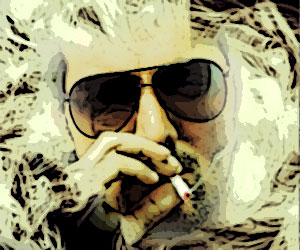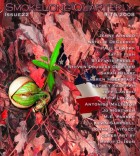The details throughout “Bounty” continue to amaze me through reread after reread. How did they end up in “Bounty”?
Details littered my Mac desktop by the time I completed “Bounty,” which is why it is now just one story from a larger collection of flash fiction stories on hunting and taxidermy. Two snippets of my family lore inspired this story in addition to unusual reading habits (I admit I read strange books found in the bowels of the public libraries in Los Angeles). “Bounty” is really mind runoff from an inordinate amount of creative curiosity. Then, there is the poet in me that creates entire stories after hearing just one word.
“Bounty” is such an interesting title for this piece. Why “Bounty”? And how does that title inform the rest of the piece?
Bounty is a double entendre. First off, the father is a bounty hunter (in the true sense) and then progresses into the armed services (all that is not said is also said with such a word as “Vietnam”).
As the story unfolds the nominal subject sort of takes a backseat to the emotional currency of a father-daughter relationship. Bounty suggests the reciprocated generosity between the two—his offering of the animals’ eyes, her offering of the coffee, their bedtime rituals.
“They become beautiful little monsters.” I love these words all lined up together, ending with monsters. What do you love about your writing, both in process and as product?
Oh, god, what a question. Um, I guess I use the “fly on the wall” technique employed by immersion journalists, which I have used as a reporter. Plus, my quiet disposition allows me to fade into the background as I look for kernels of inspiration and observe a subject. I take that same journalistic skill set and apply it to a fictional world.
Writing a story is just as much a visual journey as a writerly one for me. I tend to photograph as a means to my creative process. This trains me to see a subject from different angles in different light.
But in the end, the whole point of writing for me, is to reach greater and greater depths of compassion. For example, my self-imposed studies on the antithetical beliefs held by hunters and their ilk is an attempt to understand this mindset, since I am very left leaning in terms of animal rights and environmental concerns. Mentally, I want to walk in their shoes.
Some of my favorite lines come at the oddest times, like waking at 4:30 in the morning, sitting in LA traffic, shopping at Whole Foods, or jamming to the Foo Fighters with my little kids. I have hand-held sized Moleskin notebooks in three important places: satchel, kitchen, and bedroom. When a line hits me, I write it down no matter what. The key is remembering which notebook had which line for a story or poem; sometimes the retrieval hunt for an idea spurs other ideas. If this sounds a little disorganized you should see my closet.
At last, I tinker with sentences for weeks. During the editing process I keep repeating to myself: Just say what it is you need to say and get out (my editorial side is rather masculine, perhaps). For me, a story is done when the details dovetail and blood no longer leaks from the sentences….
“A secret can hold on so tight.” What are the consequences of holding on? What about finally letting go?
Survival depends on secrets; they have biological, sociological, psychological, and emotional roots. Secrets are like drain stoppers for a character. When you let them go, new life flourishes, but new doesn’t always mean better.
Begin this answer with the words, “I write.” Complete the sentence. Then, write as many sentences as you’d like, each one beginning with that “I write….”
I write because I am terrible at math and professions in which you make piles of money do not interest me.
I write to dissect and understand human and animal ecologies.
I write because the blank page is a really good listener.
I write every day, because if I don’t, I’m supa cranky and feel unbalanced, which are also the same reasons why I have to run or hike every day.



 The core workshop of SmokeLong Fitness is all in writing, so you can take part from anywhere at anytime. We are excited about creating a supportive, consistent and structured environment for flash writers to work on their craft in a community. We are thrilled and proud to say that our workshop participants have won, placed, or been listed in every major flash competition. Community works.
The core workshop of SmokeLong Fitness is all in writing, so you can take part from anywhere at anytime. We are excited about creating a supportive, consistent and structured environment for flash writers to work on their craft in a community. We are thrilled and proud to say that our workshop participants have won, placed, or been listed in every major flash competition. Community works.